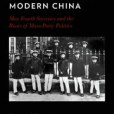《The Rise of Political Intellectuals in Modern China》是Oxford University Press出版的圖書,作者是Shakhar Rahav
基本介紹
- 書名:The Rise of Political Intellectuals in Modern China
- 作者:Shakhar Rahav
- 出版社:Oxford University Press
- 出版時間:2015年3月17日
- 頁數:256 頁
- 裝幀:Hardcover
- ISBN:9780199382262
- 價格:USD 74.00
內容簡介
The May Fourth movement (1915-1923) is widely considered a watershed in the history of modern China. This book is a social history of cultural and political radicals based in China's most important hinterland city at this pivotal time, Wuhan. Current narratives of May Fourth focus on the ideological development of intellectuals in the seaboard metropoles of Beijing and Shanghai...(展開全部) The May Fourth movement (1915-1923) is widely considered a watershed in the history of modern China. This book is a social history of cultural and political radicals based in China's most important hinterland city at this pivotal time, Wuhan. Current narratives of May Fourth focus on the ideological development of intellectuals in the seaboard metropoles of Beijing and Shanghai. And although scholars have pointed to the importance of the many cultural-political societies of the period, they have largely neglected to examine these associations, seeing them only as seedbeds of Chinese communism and its leaders, like Mao Zedong. This book, by contrast, portrays the everyday life of May Fourth activists in Wuhan in cultural-political societies founded by local teacher and journalist Yun Daiying (1895-1931). The book examines the ways by which radical politics developed in hinterland urban centers, from there into a nation wide movement, which ultimately provided the basis for the emergence of mass political parties, namely the Nationalist Party (Guomindang) and the Chinese Communist Party (CCP). The book's focus on organizations, everyday life, and social networks provides a novel interpretation of where mechanisms of historical change are located. The book also highlights the importance of print culture in the provinces. It demonstrates how provincial print-culture combined with small, local organizations to create a political movement. The vantage point of Wuhan demonstrates that May Fourth radicalism developed in a dialogue between the coastal metropoles

